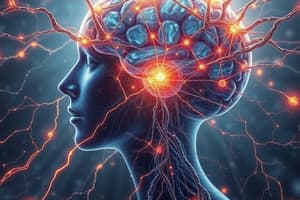Podcast
Questions and Answers
What is the main function of the Central Nervous System?
What is the main function of the Central Nervous System?
- To transmit sensory information to the brain
- To regulate body temperature
- To control and coordinate all essential functions of the human body (correct)
- To send motor signals to muscles and glands
What is the term for the process of bringing together, processing, and interpreting information received from sensory, motor, or mixed nerves?
What is the term for the process of bringing together, processing, and interpreting information received from sensory, motor, or mixed nerves?
- Motor function
- Sensory function
- Stimuli
- Integration (correct)
What is the term for the information gathered by the nervous system from sensory receptors?
What is the term for the information gathered by the nervous system from sensory receptors?
- Stimuli
- Nervous response
- Sensory input (correct)
- Motor output
Which part of the nervous system is responsible for sending information to muscles, glands, and organs?
Which part of the nervous system is responsible for sending information to muscles, glands, and organs?
What is the function of the Spinal Cord in the Nervous System?
What is the function of the Spinal Cord in the Nervous System?
What is the function of the Autonomic Nervous System?
What is the function of the Autonomic Nervous System?
What is the term for the changes that occur inside and outside the body that are detected by sensory receptors?
What is the term for the changes that occur inside and outside the body that are detected by sensory receptors?
What is the main function of the Peripheral Nervous System?
What is the main function of the Peripheral Nervous System?
What is the majority of nerves classified as?
What is the majority of nerves classified as?
What system is responsible for controlling skeletal muscles?
What system is responsible for controlling skeletal muscles?
What is the main function of the Parasympathetic Nervous System?
What is the main function of the Parasympathetic Nervous System?
Which nerves are responsible for controlling facial expressions?
Which nerves are responsible for controlling facial expressions?
What is the main function of the Vagus nerves?
What is the main function of the Vagus nerves?
How many pairs of Cranial Nerves are there?
How many pairs of Cranial Nerves are there?
What is the main function of neurons in the nervous system?
What is the main function of neurons in the nervous system?
What is the function of the Trigeminal nerves?
What is the function of the Trigeminal nerves?
What type of neurons make up the Sympathetic Nervous System?
What type of neurons make up the Sympathetic Nervous System?
What is the estimated proportion of glial cells to neurons in the human brain?
What is the estimated proportion of glial cells to neurons in the human brain?
What are the two main parts of the nervous system in vertebrate species?
What are the two main parts of the nervous system in vertebrate species?
What is the function of the Central Nervous System?
What is the function of the Central Nervous System?
What are the two types of nerves in the Peripheral Nervous System?
What are the two types of nerves in the Peripheral Nervous System?
What is the function of glial cells in the nervous system?
What is the function of glial cells in the nervous system?
What is the main function of the Peripheral Nervous System?
What is the main function of the Peripheral Nervous System?
Study Notes
Nervous System
- The nervous system is the master controlling and communicating system of the body, controlling and coordinating all essential functions of the human body.
Functions of the Nervous System
- Sensory function: monitors changes inside and outside the body, gathering information through sensory receptors.
- Integrative function: processes and interprets information, making decisions about what to do.
- Motor function: sends information to muscles, glands, and organs to respond correctly.
Cells of the Nervous System
- Two main categories: neurons and glial cells.
- Neurons: specialized cells transmitting nerve impulses.
- Glial cells: non-neuronal cells providing support, nutrition, and maintaining homeostasis.
Structural Classification of the Nervous System
- Consists of two main parts: central nervous system (CNS) and peripheral nervous system (PNS).
Central Nervous System
- Consists of the brain and spinal cord, acting as integrating and command centers.
- Integrates incoming sensory information and issues instructions based on past experience and current condition.
Peripheral Nervous System
- Consists of nerves outside the CNS, connecting the CNS to every other part of the body.
- 12 pairs of cranial nerves and 31 pairs of spinal nerves.
- Nerves can be motor, sensory, or mixed.
Autonomic Nervous System
- Has two functional divisions: autonomic nervous system and somatic nervous system.
- Autonomic nervous system: controls automatic body functions, such as saliva production, breathing, and digestion.
- Somatic nervous system: controls deliberately produced body functions, such as skeletal muscles.
Functional Divisions of the Autonomic Nervous System
- Sympathetic nervous system: prepares the body for stress, stimulating internal organs.
- Parasympathetic nervous system: brings things back to normal, inhibiting internal organs.
Cranial Nerves
- 12 pairs of cranial nerves, each with specific functions, such as:
- Olfactory nerves: smell
- Optic nerves: vision
- Oculomotor, trochlear, and abducens: eye movements
- Trigeminal nerves: jaw movements and facial sensation
- Facial nerves: facial expressions
- Auditory nerves: sounds
- Glossopharyngeal and hypoglossal nerves: tasting, chewing, and swallowing
- Vagus nerves: breathing, blood circulation, and digestion
- Spinal accessory nerves: detect changes in neck and back muscles
Studying That Suits You
Use AI to generate personalized quizzes and flashcards to suit your learning preferences.
Description
Learn about the biological basis of behavior, focusing on the nervous system as the master controlling and communicating system of the body.




